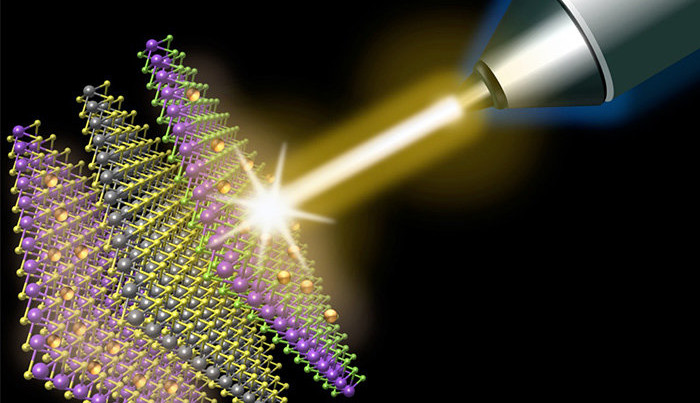Counter-intuitive movement of electrons
on

Our 'common sense' would say that when an object moves from point A to point B it necessarily has to also move through all the points between A and B. This is, however, not true for electrons in the quantum world, where these intuitive truths are not valid. Electrons can, for example appear on the first floor and then on the third floor – without ever putting a foot down on the second floor (insofar that electrons have feet, of course).
Exactly this counter-intuitive behavior has been observed by professor Hui Zhao and his colleagues in the Ultrafast Laser Lab of the
University of Kansas. In the sample, which consists of three different, ultra thin layers, electrons move from the top layer to the bottom layer without ever having been observed in the middle layer. According to Zhao this efficient form of quantum electron transport could play a key role in so-called Van der Waals materials, which have their uses in solar panels and in electronics in general.
The sample that was the subject of the research comprises three layers of semiconductor materials (MoS2, WS2 and MoSe2), each with a thickness of less than 1 nm. These three materials react to light of different wavelengths (colors).
The researchers used a laser pulse with a duration of 100 femtoseconds to knock a few electrons from the topmost MoSe2 layer so that they were able to move freely. With a laser pulse of the correct color for the bottom MoS2 layer (which, thanks to the difference in path length of 0.3mm, arrives one picosecond later than the first pulse), the appearance of the electrons in the bottom layer could be demonstrated. It appeared that the electrons on average needed 1 ps to move from the top layer to the bottom layer.
With a third laser pulse the middle layer was monitored – but no electrons on their way from the top to the bottom were ever observed there. Apparently the electrons 'jumped over' the middle layer – a behavior that has also been confirmed through simulations by theoretical physicists at the University of Nebraska-Lincoln.


Discussion (0 comments)